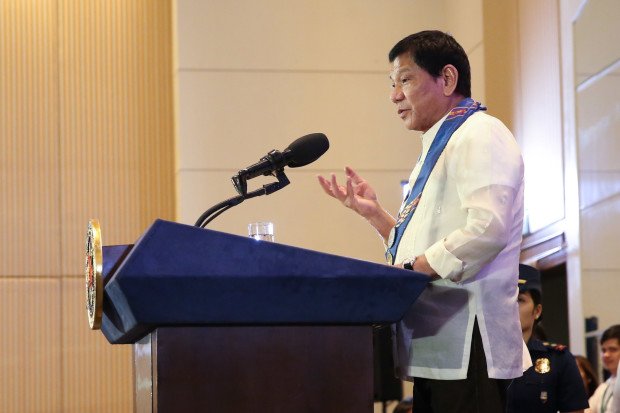Duterte orders AFP: Bomb Abu Sayyaf bandits, even with civilians
President Rodrigo Duterte has ordered government troops to bomb Moro extremists who flee with their captives in a bid to stop a wave of kidnappings at sea, calling the loss of civilian lives in such an attack “collateral damage.”
Mr. Duterte previously stated he had told his Indonesian and Malaysian counterparts that their forces could blast away as they pursued extremists who abducted sailors in waters where the three countries converged and brought their kidnap victims to southern Philippines.
In a speech to businessmen in Davao City on Saturday, the President said he had instructed the Navy and the Coast Guard that “if there are kidnappers and they’re trying to escape, bomb them all.”
“They say ‘hostages.’ Sorry, collateral damage,” he said.
Mr. Duterte said such an approach would enable the government to get even with the ransom-seeking Moro extremists.
Article continues after this advertisement“You can’t gain mileage for your wrongdoing, I will really have you blasted,” he said.
Article continues after this advertisementHis advice to potential victims? “So, really, don’t allow yourselves to be kidnapped.”
Mr. Duterte’s remarks reflect the alarm and desperation of the Philippines, along with Malaysia and Indonesia, in halting a series of kidnappings primarily by Abu Sayyaf bandits and their allies along a busy waterway for regional trade.
On Saturday, ransom-seeking Abu Sayyaf gunmen freed a South Korean captain and his Filipino crewman who were abducted three months ago from their cargo ship.
The gunmen handed skipper Park Chul-hong and Glenn Alindajao over to Moro National Liberation Front (MNLF) rebels, who turned them over to Philippine officials in the Jolo island capital.
The MNLF rebels, who signed a 1996 peace deal with the government, have helped negotiate the release of several hostages of the smaller but more violent Abu Sayyaf, which is blacklisted by the United States as a terrorist organization for kidnappings, beheadings and bombings.
Mr. Duterte’s adviser dealing with insurgents, Jesus Dureza, said he was not aware of any ransom being paid in exchange for the freedom of the sailors.
At least 27 hostages, many of them foreign crewmen, remain in the hands of different Abu Sayyaf factions, Dureza said.

President Rodrigo Roa Duterte reiterates his commitment to talk peace with the Moros in Mindanao in his speech during the 49th Annual Installation of Officers and Board of Trustees of the Davao City Chamber of Commerce and Industry Inc. (DCCCII) at Marco Polo Hotel in Davao City on January 14, 2017. KARL NORMAN ALONZO/Presidential Photo
Speculation, however, has persisted that most of the freed hostages had been ransomed off.
Without a known foreign source of funds, the Abu Sayyaf has survived mostly on kidnappings, extortion and other acts of banditry.
A confidential government threat assessment report seen by The Associated Press (AP) last year said the Abu Sayyaf bandits pocketed at least P353 million ($7.3 million) from kidnappings in the first six months of 2016.
The bandits have mostly targeted slow-moving tugboats in the busy sea bordering Mindanao, Malaysia and Indonesia. —AP